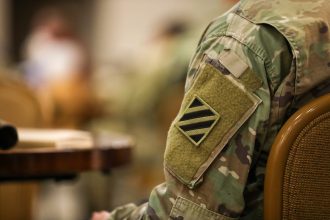Federally employed military spouses who work remotely are now “categorically exempt” from the return-to-office directive issued by President Donald Trump, according to new guidance clarifying the policy.
Federal agencies “shall” allow military spouses to continue working remotely, and agencies may continue appointing spouses to remote work positions, according to a memo issued Wednesday by Charles Ezell, acting director of the Office of Personnel Management, or OPM.
The new guidance clarifies a Jan. 27 memo from OPM and the Office of Management and Budget that included a footnote stating agencies “should also exclude military spouses working remotely based on the Military Spouse Employment Act” from the return-to-office requirement.
The Jan. 27 memo directed agencies to prepare plans to return all eligible employees to in-person work, with exceptions for those excused for compelling reasons certified by the agency head and employee supervisor. It further noted military spouses working remotely had a compelling reason not to return to in-person work and agencies “should” exempt them from the requirement.
In the wake of the Jan. 27 memo, some military spouses with federal jobs experienced uncertainty and angst about the new policy requiring in-person work. Advocates were concerned the guidance didn’t explicitly require federal agencies to exempt military spouses from the return-to-office requirement, potentially leading to inconsistent policies across agencies.
Being able to work remotely, whether in the continental U.S. or overseas, allows military spouses to continue their careers despite frequent moves to new duty stations with their service members. Working remotely opens up more opportunities for military spouses who can be appointed to remote work positions.
Military spouses have long battled problems with unemployment, largely associated with these frequent moves. The military spouse unemployment rate has remained stubbornly above 20%, according to Defense Department surveys.
The new guidance applies to spouses of active-duty members, spouses of deceased service members who died while on active duty and haven’t remarried and spouses of disabled service members who retired or otherwise left the service with a 100% disability rating. It also applies to spouses of U.S. Foreign Service members on overseas assignments.
The guidance also clarifies that agencies must allow military spouses to continue working remotely regardless of whether they were appointed under the Military Spouse Employment Act and covers those appointed under other appropriate hiring authorities. That applies to future appointments of military spouses to remote work positions.
Karen has covered military families, quality of life and consumer issues for Military Times for more than 30 years, and is co-author of a chapter on media coverage of military families in the book “A Battle Plan for Supporting Military Families.” She previously worked for newspapers in Guam, Norfolk, Jacksonville, Fla., and Athens, Ga.
Read the full article here








